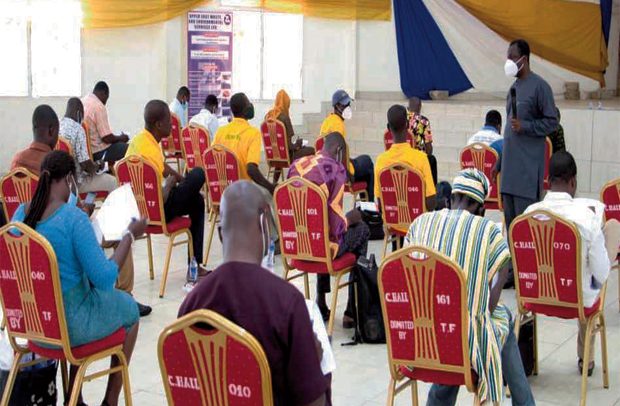A scene during the training session in Bolgatanga
The National Malaria Control Programme (NAMCOP) and its partners namely Ghana Health Service (GHS), Noguchi Memorial Institute of Medical Research (NMIMR) and Zoomlion Ghana Limited (ZGL) have organised a training workshop on Larval Source Management (LSM) for key stakeholders in the Upper East Region.
The LSM training, which will be replicated across the country, brought together about seventy (70) health workers from ten districts in the region.
The participants were equipped with knowledge and techniques in LSM, a vector control tool, targeted at mosquito breeding sites, to stem mosquito breeding which is a major contributory factor in malaria cases in the country.
Speaking at the opening ceremony in Bolgatanga on Monday, a Senior Research Fellow at NMIMR, Dr. Kwadwo Frempong, said the institute has been engaging in such exercises as measures to control malaria.
“It involves helping them to identify mosquito species and then helping them to know the sources where mosquitoes basically breed,” he explained.
He also said that “the training will be an add-on to the already malaria control programmes in the country, which are the indoor residual spraying (IRS) and the use of long-lasting insecticide nets (LLINs),” adding “this Larval Source Management is going to support these two major control programmes being that there are quite a number of advantages of the Larval Source Management.”
A Senior Vector Control Officer, Zoomlion Ghana Limited, Abel Djangmah, described the training as “good and successful,” adding, “There was full cooperation among the stakeholders.”
He explained that “the project was centred on mosquito larvae, that is, how to tackle the baby mosquito and not the mosquito itself.”
He went on to disclose that the chemical used to fight the mosquito larvae, only works in water bodies.
“Last year, we were using Bacillus thuringiensis subspecies israelensis (Bti). It works best when you put it into water bodies. One challenge that we had with what we were using previously, that was 2019 and 2020, is that the chemical or the biological agent is able to last just within one week. So every week, you have to go and do reapplication,” he said.
That process, Mr. Djangmah indicated, was quite exhaustive and time consuming, which put a lot of financial constraints on the project.
“But thankfully, this time around, we are shifting from the one-week spraying to monthly larviciding. So instead of doing the spraying every week, the product is able to last within the environment for one month. So after a one-month duration, you go back again and do the reapplication,” he said.
LSM, a vector control tool for managing mosquito breeding sites, is only recommended as a supplementary malaria vector control measure which adds on to other core vector control interventions such as long-lasting insecticidal treated nets (LLINs) and indoor residual spraying (IRS).


